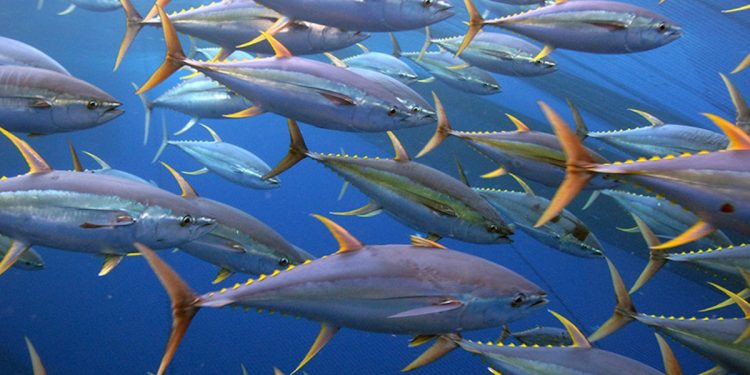A coalition of companies from across global tuna supply chains aims to stop illegally caught tuna reaching markets and seeks to boost environmental sustainability and respect for human rights in tuna fisheries around the world.
The Global Tuna Alliance builds on the Tuna 2020 Traceability Declaration, signed by 66 companies – ranging from major retailers to seafood processors in key markets around the world that are all committing to push for ambitious change in the tuna sector – and supported by six national governments and 21 civil society organisations.
The alliance’s members are expected to source tuna from fisheries certified by the Global Seafood Sustainability Initiative’s recognised sustainability standards or comprehensive Fishery Improvement Projects.
They are also called to engage with RFMOs to push countries to endorse ambitious policies underpinning sustainability and respect for universal human rights, such as the Port State Measures Agreement.

The initiative is convened by Friends of Ocean Action, a public-private partnership led by the World Economic Forum and World Resources Institute involving a group of more than 50 global leaders across a range of sectors who are fast-tracking solutions to the most pressing challenges facing the oceans.
‘We need the ocean as much as the ocean needs us. Groups like the Global Tuna Alliance offer an exciting opportunity for collaboration across public, private and civil society sector partners to bring about positive change, making important common property resources like tuna fisheries more sustainable, socially responsible, productive and profitable. Everybody wins,’ said Dominic Waughray, managing director and head of the Centre for Global Public Goods at the World Economic Forum.
The focus of the Global Tuna Alliance will be on ensuring effective traceability, including tracking tuna products from vessel to final buyer – underpinning sustainability efforts as it creates transparency and accountability within the supply chain.
Companies must track key data elements throughout their supply chains and adopt specific policies for import controls to ensure greater clarity in tracing fish from the moment they are taken from the ocean. This includes stringent policies to expose and eliminate any forced labour and human rights abuses throughout tuna supply chains.
‘The Global Tuna Alliance commitments can bring about lasting positive change for both people and nature across the tuna sector – from bait to plate,’ said Peter Thomson, the UN Secretary-General’s Special Envoy for the Ocean and Co-Chair of Friends of Ocean Action.
Social responsibility and respect for human rights will be prioritised by conducting risk assessments, sourcing tuna from fisheries certified in compliance with social standards and working to improve forced labour criteria. The alliance will also push for greater sustainability of tuna sources, choosing those holding third-party certifications recognised by GSSI, and working with those that don’t to undergo a fishery improvement project.

‘Tuna fisheries are the most valuable fisheries in the world. They support communities and livelihoods, as well as providing healthy protein to global markets,’ said Tom Pickerell, executive director of the Global Tuna Alliance. ‘Despite this, the sector is struggling with poor fisheries management and limited monitoring – yet we have the knowledge and tools at our fingertips to make vast improvements. Now, we also have the commitments to make positive change happen across the sector. The Global Tuna Alliance will harness the economic leverage of the supply chain to see needed improvements realised.’
He brings 16 years of experience in seafood sustainability and cleaning up global fisheries supply chains to the alliance. He has previously worked for organisations including the Monterey Bay Aquarium, Seafish, WWF and the Sustainable Fisheries Partnership.
‘The Global Tuna Alliance is unique in its ambition and will represent what we believe to be a new wave in how businesses need to engage in sustainability issues. We encourage other responsible businesses to sign up to the mission and work together to deliver global change,’ said Cassie Leisk, Head of Sustainability at New England Seafood International and Member of the Global Tuna Alliance Management Board.
Ending illegal fishing is a key strategic priority for the Friends of Ocean Action as part of its remit to drive transformative and scalable initiatives like the Global Tuna Alliance to help the international community act swiftly to conserve and sustainably use our ocean, as Sustainable Development Goal 14 states.
The group is co-chaired by Peter Thomson, the UN Secretary-General’s Special Envoy for the Ocean.
‘This is a moment of opportunity for sustainable fisheries and ocean conservation, and we have an immense responsibility to get it right,’ Peter Thomson said.
‘The dedication of Global Tuna Alliance partners to eliminate illegal, unreported and unregulated fishing in tuna supply chains – and to ensure tuna meets the highest standards of environmental performance and social responsibility – gives me great hope.’









